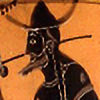HOME | DD
 retransmission — Tunguska event
retransmission — Tunguska event

#comet #fallenstar #legends #mythology #siberia #spirits #tunguska
Published: 2016-09-30 05:47:21 +0000 UTC; Views: 1255; Favourites: 53; Downloads: 0
Redirect to original
Description
"Ancient Echoes"watercolor/gouache/acrylic/paper. 59 X 42 cm. 2016 year
Related content
Comments: 33

I like the action and colors. Very good work Dmitry
👍: 0 ⏩: 1

Thank you Canan! Glad you like the colors
👍: 0 ⏩: 0

Cool! I believe it was caused by frogs falling from the sky. Lots of frogs...
👍: 0 ⏩: 1

ha ha, it sounds really funny, it reminded me of one of the hilarious hypothesis of this event. The explosion of giant swarm of mosquitoes over the taiga is really close to your interpretation
👍: 0 ⏩: 1

I did read your mosquito comment. I'm not sure, but is a giant swarm of mosquitoes is supposed to have caused it, they must have been flying at Mach 315 or so in order to generate the energy to cause such devastation
👍: 0 ⏩: 1

This version was a joke of course. Those guys (researchers) have suffered from mosquitoes every day while traveling. Probably, they mentioned about the explosion of the swarm just for the laughs. By the way in the Taiga so many mosquitoes. It's a really big problem but locals do not even notice their bites.
👍: 0 ⏩: 1

In that case the Taiga would be for me because I apparently have "sour blood" for mosquitoes. My brother has "sweet blood", we were once in the North of Finland as children with our parents, and we had to return to Sweden after a day or two because the mosquitoes were eating him alive. They were massive too, almost 1 cm long, and the wood ants crawling around the public toilets next to the roadside were even bigger. Truly monster insects! It's probably because of the 24 hours daylight period that they keep growing all the time in the summer.
👍: 0 ⏩: 1

Thank you for your story! I can imagine this, because I was in a similar situation. I do not really know about the sour/sweet blood, probably it makes sense. But I noticed locals just do not notice those mosquitoes, maybe they have a special immunity, who knows...
👍: 0 ⏩: 1

The sweet/sour blood is an ancient explanation of why mosquitoes attack some people and not others and is obviously incorrect, though it is still used in a kind of poetic way. I think in reality it has to do with body odor. Diet might have a lot to do with it. Do those people up north eat lots of chives or onions or something?
👍: 0 ⏩: 1

I do not think that the reason in onions or other foods. People just learned to ignore them, because they live near forests full of mosquitoes many many years. It's just not a problem for them. Perhaps people got some immunity from their ancestors.
👍: 0 ⏩: 1

"The most significant chemicals mosquitoes use to locate us and bite us include l-lactic acid, ammonia, carboxylic acids, and octenol, in combination with one another. In experiments, scientists found that adding l-lactic acid to the scent of an unattractive person made them more attractive to Aedes aegypti mosquitoes, and vice versa. [...] The most significant chemicals mosquitoes use to locate us and bite us include l-lactic acid, ammonia, carboxylic acids, and octenol, in combination with one another. In experiments, scientists found that adding l-lactic acid to the scent of an unattractive person made them more attractive to Aedes aegypti mosquitoes, and vice versa. [...] Yet another component of human odor is genetic. Although some theorize that individuals mosquitoes find unattractive simply produce less in the way of attractants, an alternative theory asserts that they produce components that interfere with mosquitoes’ ability to find their hosts. In fact, a 2008 study identified five such chemicals produced by humans found unattractive to mosquitoes." www.rawstory.com/2015/06/why-m…
So there is indeed a strong component of body odor, which is at least partially genetically determined. This web page suggests that diet can indeed make you more or less attractive to mosquitoes: www.ba-bamail.com/content.aspx… . It doesn't look too scientific though. Still, the strongest "attractor" for mosquitoes is apparently the carbon dioxide we breathe out, so then the best way to avoid getting bitten is to be as lazy as possible
👍: 0 ⏩: 1

Thank you for this information. All these researchers are really make sense. Next time when I go into the taiga,I will be better prepared to confront those super evil mosquitoes. I think diet is not a big problem for me
👍: 0 ⏩: 1

I read Путешествие из Петербурга в Москву btw. In Russian! I can only describe it as "a glorious ordeal". I saw that kids in Russia are supposed to read it as a part of the required reading list. Poor kids.. But at least now I'm familiar with interesting words like яко, буде/коли, николи etc.
👍: 0 ⏩: 1

Cool! I'm surprised you have interest in Russian literature 
👍: 0 ⏩: 1

I'm not sure I'm that much interested in Russian literature or in literature in general. I used to, but I seem to have drifted off towards politics. One thing that makes Radischev so radical is the fact that he calls upon the powers to be honest. Expecting honesty from those in power is a VERY radical idea
👍: 0 ⏩: 0

What is "Tunguska"?
...
I am sure that your neat style added many dimensions of the concept. love the bright images ( a fireball?) in front of the reddish brown and dark purple tones. Thanks for sharing this wonderful piece of art dear friend with us :d
👍: 0 ⏩: 1

Tunguska is a name of a river in Siberia. In 1908 there was a large explosion, this incident has caused a lot of questions and hypotheses. Someone suggests that it was a comet, others believe in the mystical versions (crash of an alien ship, arrival of the gods, etc). Anyway this event is still a great mystery. Although, scientists follow to the version of falling a giant meteorite
Thank you for your impression of this work, my friend!
👍: 0 ⏩: 1

Ah!...I must return your fantastic submission again...And to be informed the way you transfer the "Tunguska event" Thanks for your detailed explain dear friend. Please have a nice day tomorrow
👍: 0 ⏩: 1

I was really glad to share some information about this phenomenon with you Ayhan!
👍: 0 ⏩: 1

I will keep it in my mind because it comes from an artist like you my friend
👍: 0 ⏩: 0

Cool video
👍: 0 ⏩: 0

Wow this is amazing!
And I like legends about the disaster of Tunguska.
👍: 0 ⏩: 1

I have a book about the Tunguska phenomenon, it's include 77 versions of this strange event
👍: 0 ⏩: 1

Wow! 77 different versions? I don't know more than three or four...
👍: 0 ⏩: 1

Yep! The most hilarious version is the explosion of a huge swarm of mosquitoes. Well it was ironic, I think those guys (researchers) simply suffered from Siberian mosquitoes
👍: 0 ⏩: 1

It's really funny indeed.
I heard terrible things about voracity of Siberian mosquitoes, but devastate more than 2000 km2 of forest seems a little bit improbable.
👍: 0 ⏩: 0




































